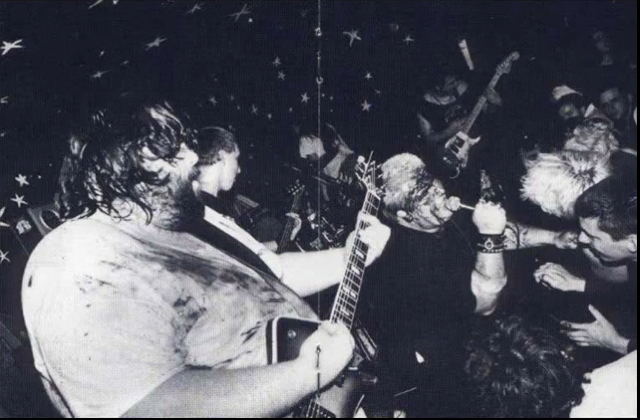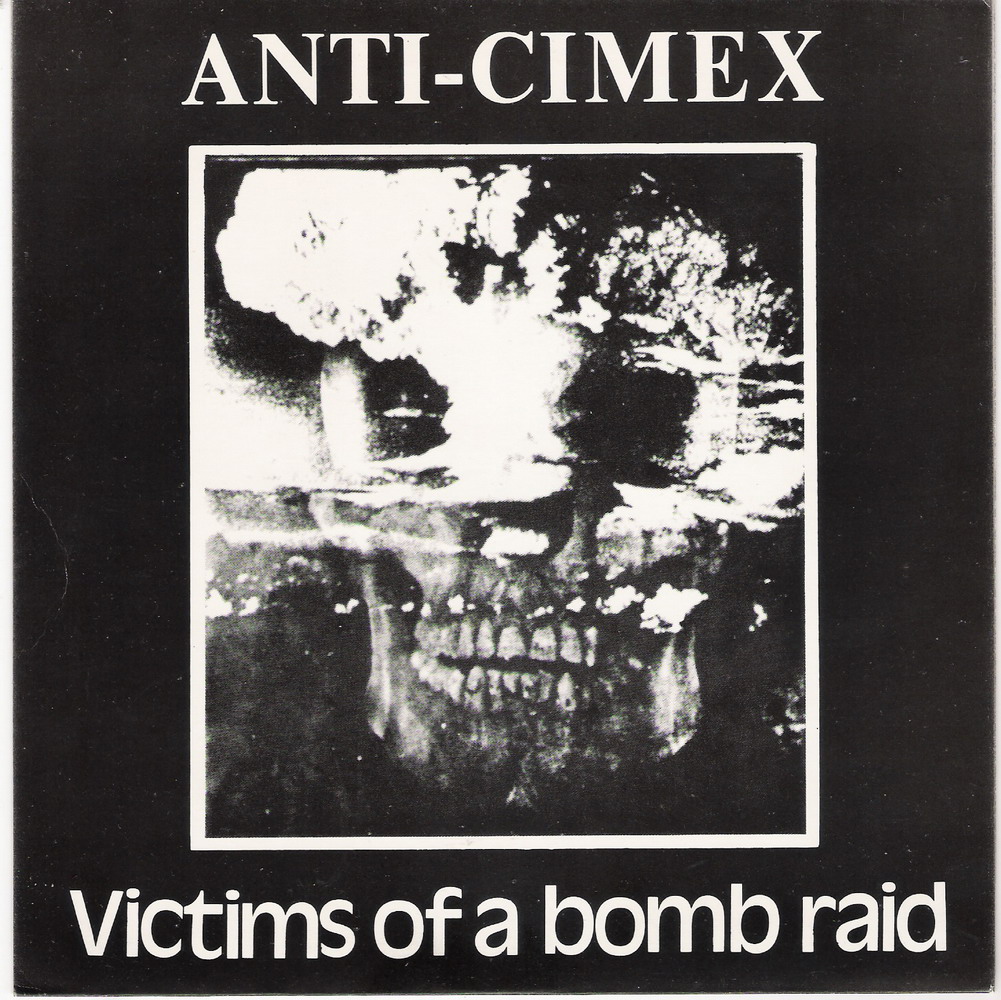Poison Idea, like Black Flag and MDC, are one of the big guns of American hardcore. Founded in Portland, Oregon in 1980, proof of Poison Idea’s importance can be found in the fact that by 1986 they were calling themselves the Kings of Punk (the title of their 1986 LP) — and no one argued. It’s hard to imagine any other band pulling off this feat, especially a mere six years into their existence. (Granted, six years is longer than most bands lasted in that era.) For Poison Idea, however, the title seemed natural.
Southern Lord has announced that it will reissue the punk kings’ remastered catalog throughout 2012. Their first offering is a repackaged and expanded version of the early Darby Crash Rides Again demos and rarities originally released in 1989 on the band’s own American Leather label. (Street punk imprint TKO is releasing the vinyl.)
Remastered by Jack Control (World Burns to Death) in Austin, Texas at Enormous Door Studios, the 29 tracks on Darby Crash total less than an hour. (In other words, the songs are very fast). The material is split into 4 parts: First, the previously unreleased 1981 Boner’s Kitchen demos; second, the 1982 Darby Crash demos that historically preceded the band’s iconic 1983 Pick Your King EP; third, live tracks from a 1983 performance at KBOO in Portland; and, fourth, two outtakes from sessions that produced the 1984 Record Collectors Are Pretentious Assholes EP. While Darby Crash Rides Again isn’t the release with which to hear Poison Idea for the first time – first, go to the Pick Your King and Ian MacKaye EPs, and then go to the Feel the Darkness LP, in that order – it showcases the band’s ugly, snotty, and chaotic roots, at the genesis of the American hardcore movement.
The 1981 Boner’s Kitchen demo tracks start the collection, presenting a young band bristling with energy and excitement just as US hardcore was shifting into high gear. These tracks sizzle with white noise: Trebly guitars, cymbals crashing right and left as singer Jerry A.’s ranting vocals hiss and shout. The tracks are raw and primal. These are lo-fi demo cuts indeed, and there’s only so much that the remastering job can do to pull these songs out of the primitive (and low budget) sonic vortex within which they swirl. A few songs, like “Death Pact,” are hampered by the band’s self-conscious attempt at mimicking the Germs. Still, the songs show a band exploring its own latent powers, figuring out what works, and what doesn’t. Boner’s Kitchen is all about gearing up for the assault.
It’s not until the actual 1982 Darby Crash Rides Again demos start at track 7 that the band’s manic maelstrom takes definite shape. Poison Idea’s sound suddenly, recognizably coalesces into the form that most know from the seminal Pick Your King EP. Gone is Jerry A’s attempt to emulate Darby Crash’s vocal style; here he has discovered his own unique voice and power. On the Darby Crash demos the band is super tight, fast as hell, and the guitar playing is unapologetically punishing. Guitarist Tom “Pig Champion” Roberts delivers a series of monster power chord progressions (check out “Bounce the Rubble” for proof,) while Jerry A’s vocals frantically race to keep up with it all. Dean Johnson’s frenetic drumming propels the band forward at a whiplash-inducing pace. The band that is captured in this segment of the collection is one of the most powerful rock and roll juggernauts on the planet at that time. Here, Poison Idea delight in breaking speed limits, transgressing musical boundaries, and entering into uncharted sonic territory. Few bands were this uncompromisingly fast or punishing in 1982 (except maybe Discharge, Hellhammer, Larm, DRI, and MDC.) In retrospect, they were at the forefront of a new level of extremism in rock music.
For Poison Idea, of course, transgression was not limited to the recording studio. It really was a day-to-day lifestyle. The collection’s title refers to The Germs’ Darby Crash for a reason. For Poison Idea songwriter and vocalist Jerry A (nee Jerry Lang), Darby Crash was a personal, creative muse. Having died at age 22 of a heroin overdose, Crash served (and continues to serve) as an iconoclastic archetype of the punk ethos of living by one’s own rules no matter the mortal cost to oneself. This was something that members of Poison Idea took (and continue to take) seriously. Jerry A’s obsession with physical self-harm (self-scarification with razor blades, or with anything else), alcohol, sexual sadomasochism, drugs of almost all varieties, and junk food are well known, and have informed every phase of Poison Idea’s songwriting. A lifestyle of ruthless excess and fatalistic, consequences-be-damned indulgence was embraced early on.
Pig Champion died in 2006 at age 47, while weighing close to 500 lbs. Drummer Steve “Thee Slayer Hippy” Hanford was arrested for robbing pharmacies in 2008. And yet to call the band’s collective lifestyle “debauchery” is not quite right; to me, the word “debauchery” implies a backdrop of decadent wealth, and Poison Idea were fine with living in poverty. “I’m a fucking dishwasher, right?” Jerry A told Flipside in 1990. “I live in poverty and that’s all I want — to be drunk and pissed and then every once in a while I might go see a show and have some fun, maybe cock a smile. Everything sucks, it really does. All this bullshit that’s going on. We screamed ‘no future’ a thousand years ago, but the fucking shit seems to keep on keeping on.”
In fact, the song “Young Lord,” present on this collection, was written about Darby Crash, and the lyrics reveal the origin of Poison Idea’s name: “Speed and alcohol consumption / When my conscience is altered / I’ll take this place and leave it in ruins / […] My ideas are poison / I got nothing.” Another track, “All Right,” would never be recorded for a proper studio release after these demos – head-scratchingly so, given that “All Right” is one of the stand out tracks and major gems of this collection. Indeed, the Darby Crash Rides Again demos are the centerpiece of this release. Although they initially came out in 1989 on Poison Idea’s own American Leather label (another Germs reference), the remastered versions here have more heft and overall power than the 1989 versions, which did not do the songs justice.
The KBOO segment of this collection captures a live show that Poison Idea played for a small crowd in Portland during a local radio station’s pledge drive in 1983. The audio quality is almost on a par with the Boner’s Kitchen demos at the beginning of the CD and is probably of interest only to hardcore (no pun intended) Poison Idea fans. In between songs, the band threatens to quit playing if no one calls in to support the station with pledges; a song or two later, the band reverses course and threatens to not _stop_ playing unless more people call in. Of particular interest here is the song “Spy,” which boasts impressive and intricate surf guitar playing, sounding sort of like a cross between the Dead Kennedys’ Police Truck and something Greg Ginn might come up with after listening to The Ventures. It’s too bad the band never did a proper studio recording of this track, either.
The last two tracks on the collection are proper studio outtakes, so the sound quality is excellent. “Town Hall” begins as a piss-take on the Sex Pistols’“Anarchy in the UK” but quickly launches into a high-velocity USHC thrasher. The last track is probably the best cover of the Hawkwind song “Motorhead” that Poison Idea ever did. (There is another version of this song on this release, too, played during the KBOO Radio segment.)
Although Poison Idea have always cited The Germs, Black Flag, S.O.A., and the first two Discharge EPs as their primary influences, what the band accomplished by their first EP — and which is amply in evidence on the demos here that led up to that EP – is help craft an evolutionary advance on the basic punk rock of 1977 by distilling that movement’s elements of speed and power into more potent forms. What Poison Idea thus helped create are some of the defining characteristics of the American hardcore punk sound and experience. Although there is a preoccupation in the lyrics with inner turmoil, self-abuse, and good old fashioned inebriation, the band were not simple apolitical hedonists; the song “Rich Get Richer,” for example, present on Darby Crash collection, is essentially about class disparity: “The rich getting richer, who says that it has to be? / Money talks, money screams, / Middle class lies, American dreams, / The rich get richer, the poor get poorer, / Who says it has to be?”
This release is highly recommended.
Note: Although Pig Champion passed away in 2006, vocalist Jerry A continues to take the band on limited tours every few years. Their last album of new material was 2006’s Latest Will and Testament, which included Champion.
Screenshot courtesy of MrZiplock23. Published under a Creative Commons license.






For me, the power of Poison Idea came from their lack of pretention, lack of contrivance. This was not the art school pranksterism of the DKs, the LA posturing of Black Flag, or the political awareness of MDC. I loved those others bands too, but Poison Idea was more a working class, straight ahead car crash of an experience. In the documentary Northwest Passage, Pig talks about punk rock saving him from a life of miserable drudgery. And you believe him. It’s easy to forget, in these days when the internet has destroyed the notion of colloquial music scenes, that hardcore was a lifeline for isolated, dispirited kids in out of the way places like Portland. I mean, you could always imagine Biafra and Rollins and so on doing something else. But when Pig and Jerry laid it down, you felt like they were fighting for their lives. RIP Pig.
@ Josh: Yes, exactly.